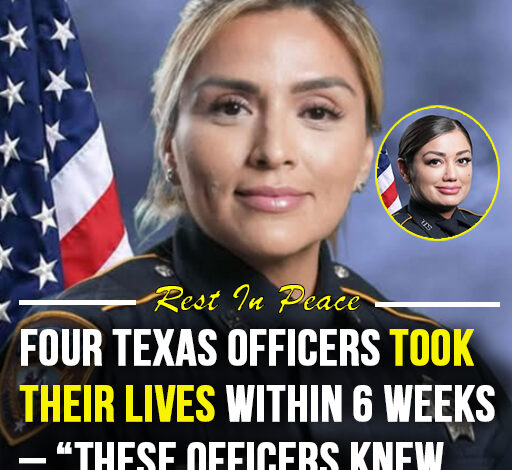
Within a span of six weeks, four deputies from the same department took their own lives!
In Texas, a sheriff’s department is facing a crisis so devastating that it has sent shockwaves throughout the state and across the nation. Within a span of just six weeks, four deputies connected to the Harris County Sheriff’s Office (HCSO) took their own lives, a heartbreaking series of losses that has left colleagues, families, and the wider community reeling.
The news broke on March 19, when Harris County Sheriff Ed Gonzalez posted on Facebook to share the passing of retired deputy William Bozeman. Gonzalez’s message was heavy with grief: “Our hearts are heavy. We extend our deepest condolences to their families, colleagues, and friends. Life is fragile, and time is not promised. May they Rest in Peace.” At first, Bozeman’s death was reported as the third suicide in just one week, but the reality was even more devastating. His passing marked the fourth suicide tied to the department in only six weeks, revealing a grim pattern that underscored the mental health crisis in law enforcement.
Earlier that same month, on March 13, the department lost Deputy Christina Kohler, a 37-year-old officer whose sudden death left coworkers stunned. Just three days later, tragedy struck again with the passing of retired Deputy Maria Vasquez, 42. The news of both women’s deaths was confirmed by ABC affiliate KTRK and shared by the HCSO Community Engagement Division, which posted a heartfelt tribute: “Heaven has gained two beautiful angels—Deputy Christina Kohler and retired Deputy Maria Vasquez. May their memory inspire strength and comfort to friends, family, and coworkers during this difficult time.”
But the string of losses had begun even earlier. On February 6, former Deputy Nguyen, age 58, died by suicide. The medical examiner confirmed the cause of death, and those who had worked with him for decades were left grappling with shock and sorrow. For many inside the department, Nguyen’s death was already a blow that reverberated through the ranks. To then face three more suicides in such quick succession was nothing short of unbearable.
Jose Lopez, president of the Harris County Deputies’ Organization, spoke candidly about the emotional toll these tragedies inflicted. He had known two of the fallen officers personally for over 20 years. “One is too many,” Lopez said. “Two? Three? Four? It’s devastating. It hits very close to home and reminds us how fragile life is. We need to look out for each other and take care of one another.”
The grief has also reignited an urgent national conversation about mental health in law enforcement. Between 2016 and 2022, at least 1,287 public safety officers in the United States died by suicide, according to a joint study by CNA Corporation and the nonprofit First H.E.L.P. Researchers caution that the true number is likely higher due to underreporting. Studies by Dr. John Violanti, a leading expert at the University at Buffalo, reveal that law enforcement officers face a suicide risk 54 percent greater than those in other professions. The constant exposure to trauma, violence, and life-or-death situations takes a toll that few outside the profession can fully grasp.
“This profession changes people,” explained Thomas McNeese, who leads the HCSO’s wellness program. “The longer you’re in it, the more it changes you. The back-to-back suicides felt like a bomb going off.” McNeese’s comments reflect a hard truth: despite the resources available, the current approach may not be enough.
Sheriff Gonzalez himself admitted the depth of his pain. “It hurts, and I grieve each loss,” he told CNN in a recent interview. “When a deputy dies by suicide, it’s particularly painful because I can’t stop wondering what could have been said or done to help them.” His words capture the helplessness many feel in the aftermath of these tragedies.
Inside the department, leaders and officers are now asking hard questions. Are the existing mental health programs sufficient? Do deputies feel comfortable reaching out for help without fear of stigma or career repercussions? And if not, what must change to ensure no one else feels that suicide is their only way out?
The issue extends far beyond Harris County. Across the nation, police departments, sheriff’s offices, and other emergency agencies face similar struggles. Law enforcement professionals often deal with post-traumatic stress, burnout, and the weight of witnessing humanity at its worst day after day. Yet cultural barriers and a long-standing ethos of toughness can discourage officers from seeking help until it’s too late.
The four suicides in Harris County have become a rallying cry for urgent reform. Advocates argue that mental health support must be as ingrained in law enforcement as firearms training or tactical preparation. Peer support programs, confidential counseling services, mandatory wellness checks, and greater public awareness are all potential steps forward.
For the grieving families, though, solutions cannot come soon enough. Their loved ones’ service and sacrifice are now remembered not only for their dedication to the community but also as stark reminders of the hidden battles that too many officers fight in silence.
The tragedy has united the Harris County community in mourning, but it has also sparked a broader reflection on the human cost of public safety. Officers are trained to save others, yet they often struggle to save themselves. Communities that rely on them every day must recognize their vulnerability and find ways to offer the support and compassion they desperately need.
As Sheriff Gonzalez wrote in his Facebook message, life is fragile and time is not promised. For the Harris County Sheriff’s Office, those words are now more than a sentiment—they are a haunting reminder of the urgency to act before more lives are lost.




